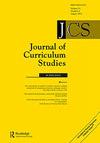Citizenship education under authoritarian Islamic nationalism: an exploration of teachers’ conceptions of citizenship in Turkey
IF 2
3区 教育学
Q1 EDUCATION & EDUCATIONAL RESEARCH
引用次数: 1
Abstract
ABSTRACT This study explores a group of social studies teachers’ conceptions of citizenship by taking into consideration the country’s increasingly authoritarian political culture. It offers an analysis of semi-structured interviews carried out with 20 teachers working at state middle schools in a relatively secular city. The study found that the majority of the teachers are subscribed to a non-democratic conception of citizenship that prioritizes an uncritical loyalty to the nation, inculcates passive compliance, relies on a pro-Muslim notion of human rights, and makes little room for political issues discussion. Despite that, some teachers seem to develop oppositional discourses and seek ways to claim their agencies. The study concludes that the authoritarian Islamic nationalism in power has intensified the ethno-religiously nationalist, statist, and duty-centric aspects of citizenship education (CE). Some teachers’ explicit emphasis on pro-Islamic and anti-western discourses and almost all teachers’ explicit concern to stay away from politics emerge as novel characteristics that are consistent with the dictates of Turkey’s authoritarian regime. It seems authoritarian populist nationalism redresses citizenship as an exclusionary notion grounded in race, ethnicity, religion, and civilizational claims. Insights from this research may help the advocates keep CE supportive of democratic values under authoritarian conditions.伊斯兰威权民族主义下的公民教育:土耳其教师公民观念的探索
本研究探讨了一群社会学科教师的公民观念,考虑到该国日益专制的政治文化。它提供了对在一个相对世俗的城市的公立中学工作的20名教师进行的半结构化访谈的分析。研究发现,大多数教师都认同一种非民主的公民观念,即优先考虑对国家的不加批判的忠诚,灌输被动的服从,依赖于亲穆斯林的人权观念,几乎没有讨论政治问题的空间。尽管如此,一些教师似乎发展了对立的话语,并寻求声称自己代理的方法。该研究的结论是,掌权的专制伊斯兰民族主义强化了公民教育(CE)的民族宗教民族主义、国家主义和责任中心方面。一些教师明确强调亲伊斯兰教和反西方的话语,几乎所有教师明确表示要远离政治,这些都是与土耳其独裁政权的指令一致的新特征。专制的民粹民族主义似乎将公民身份重新定位为一种基于种族、民族、宗教和文明主张的排他性概念。本研究的见解可能有助于倡导者在专制条件下保持对民主价值观的支持。
本文章由计算机程序翻译,如有差异,请以英文原文为准。
求助全文
约1分钟内获得全文
求助全文
来源期刊

Journal of Curriculum Studies
EDUCATION & EDUCATIONAL RESEARCH-
CiteScore
4.70
自引率
4.80%
发文量
19
审稿时长
24 weeks
期刊介绍:
Journal of Curriculum Studies publishes conceptually rich contributions to all areas of curriculum studies, including those derived from empirical, philosophical, sociological, or policy-related investigations. The journal welcomes innovative papers that analyse the ways in which the social and institutional conditions of education and schooling contribute to shaping curriculum, including political, social and cultural studies; education policy; school reform and leadership; teaching; teacher education; curriculum development; and assessment and accountability. Journal of Curriculum Studies does not subscribe to any particular methodology or theory. As the prime international source for curriculum research, the journal publishes papers accessible to all the national, cultural, and discipline-defined communities that form the readership.
 求助内容:
求助内容: 应助结果提醒方式:
应助结果提醒方式:


